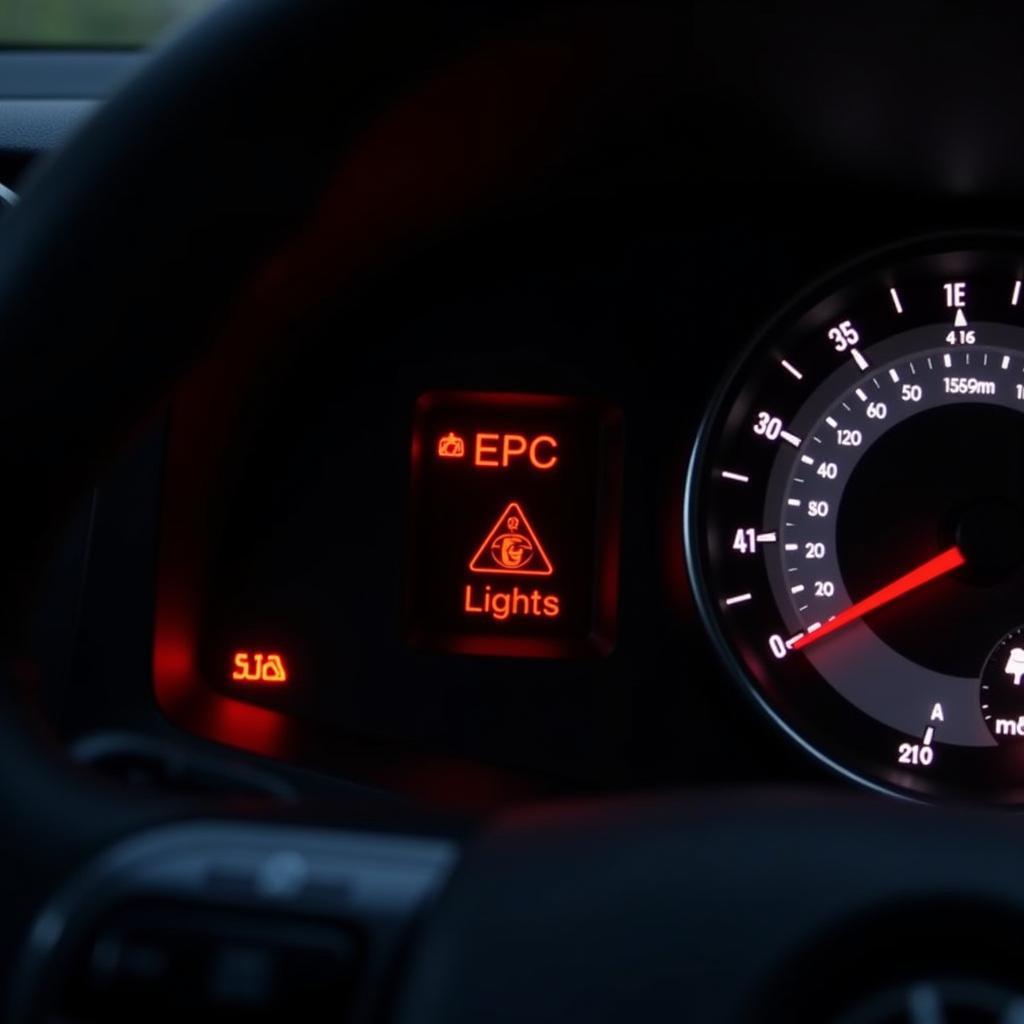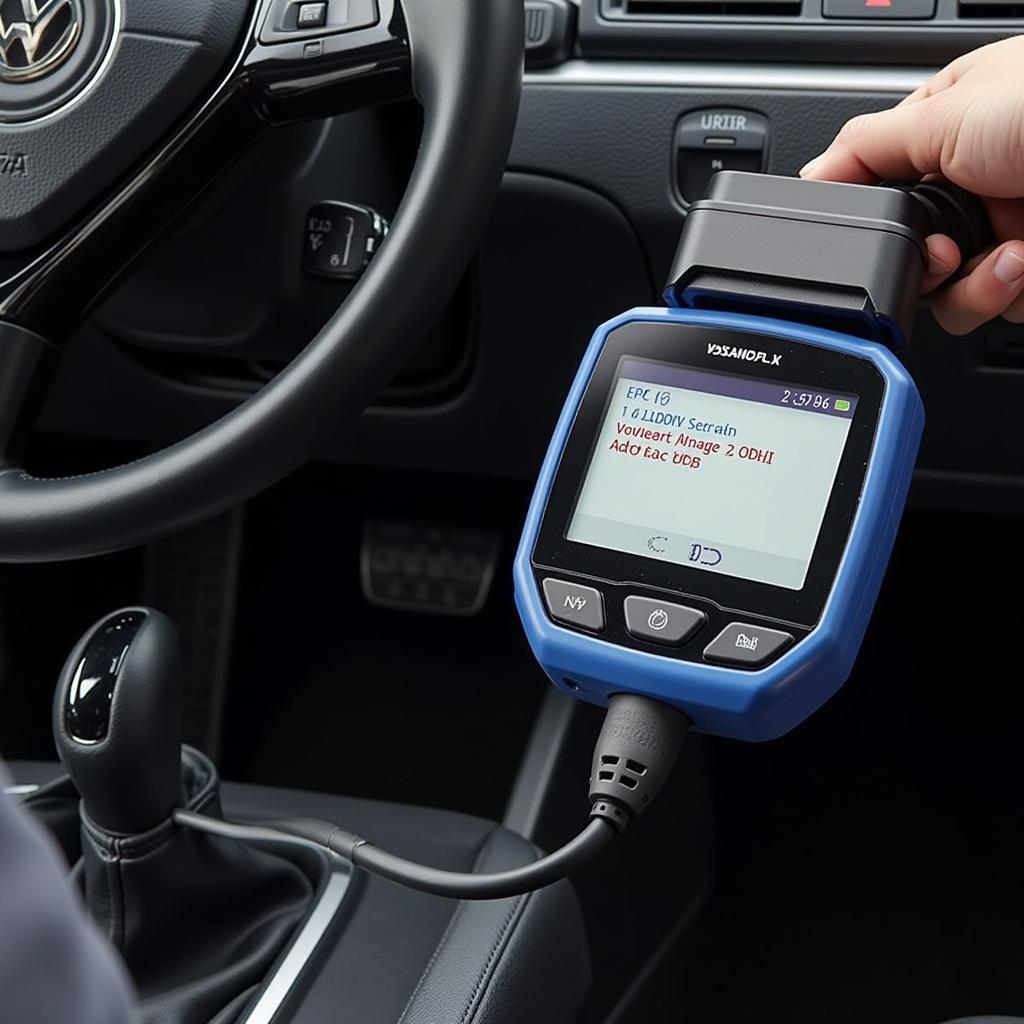Your cart is currently empty!

Decoding VW EPC Codes: A Comprehensive Guide to Troubleshooting Your Volkswagen
Understanding the inner workings of your Volkswagen can feel like deciphering ancient hieroglyphics, especially when it comes to those cryptic error codes. Whether you’re a seasoned mechanic or a Volkswagen enthusiast, encountering “VW EPC Codes” can be a frustrating experience. This comprehensive guide will demystify these codes and provide you with the knowledge to diagnose and address issues affecting your Volkswagen.
After reading this article, you will understand what VW EPC codes are, how to read them, and common problems associated with specific codes.
 VW EPC Code Dashboard
VW EPC Code Dashboard
What are VW EPC Codes?
EPC stands for Electronic Power Control. This system is the brain behind your Volkswagen’s engine management, constantly monitoring various sensors and components to ensure optimal performance and efficiency. When the EPC system detects an anomaly, it triggers the EPC warning light on your dashboard and generates a corresponding code stored in the vehicle’s computer.
Unlike the more familiar “Check Engine Light” which typically signals emission-related problems, the EPC light encompasses a broader spectrum of potential issues. These can range from minor glitches in the throttle pedal position sensor to more critical problems within the engine control unit.
How to Read VW EPC Codes
Accessing and interpreting these codes requires a diagnostic tool known as an OBD-II scanner, readily available online or at auto parts stores.
- Locate the OBD-II Port: Typically found beneath the driver’s side dashboard.
- Connect the OBD-II Scanner: Plug the scanner into the port and turn the ignition to the “on” position (without starting the engine).
- Retrieve the Codes: Follow the scanner’s instructions to access the stored codes.
- Decode the Codes: Each code consists of five digits. For example, you might see a code like “P0171”.
- The first character (“P”) signifies it’s a powertrain code.
- The second digit (0) indicates a standardized code defined by the Society of Automotive Engineers (SAE).
- The third digit (1) points to a specific system, such as fuel or air metering.
- The final two digits (71) specify the particular problem within that system.
 OBD-II Scanner Reading VW EPC Code
OBD-II Scanner Reading VW EPC Code
You can find comprehensive lists of VW EPC codes and their meanings in resources such as:
- Online automotive forums dedicated to Volkswagen vehicles
- Repair manuals specific to your Volkswagen model
- Websites specializing in automotive diagnostic information, like vw epc code.
Common VW EPC Codes and Their Meanings
While the specific codes and their associated problems can vary depending on your Volkswagen model and year, here are some of the more common ones:
-
18049 vw code: This code often indicates an issue with the throttle position sensor, a vital component that communicates the position of your gas pedal to the engine control unit. A faulty sensor can lead to erratic acceleration, reduced engine power, or even cause your car to enter “limp mode.”
-
vw golf pd engine codes: This code points to a problem within the Diesel Particulate Filter (DPF). The DPF is designed to trap soot from the exhaust gases of diesel engines. A clogged DPF can lead to reduced engine performance, increased emissions, and even trigger the EPC warning light.
-
epc vw polo error code: This error code can indicate a problem with the brake light switch. It’s a critical safety component as it signals to the engine control unit (ECU) that the brake pedal is pressed.
“Diagnosing and resolving EPC issues requires a methodical approach. Always prioritize addressing the most critical codes first, as they might be interconnected.” – Mark Johnson, Senior Automotive Diagnostic Technician
What to Do When Your EPC Light Comes On
- Don’t Panic: While the EPC light can seem alarming, it doesn’t always signal a catastrophic failure.
- Assess Drivability: If your Volkswagen seems to be running relatively smoothly, you can likely continue driving cautiously. However, if you experience significant performance issues, such as loss of power or unusual noises, it’s best to pull over when safe and seek immediate assistance.
- Read the Codes: Use an OBD-II scanner to retrieve the specific codes stored in your vehicle’s computer. This step is crucial in pinpointing the root cause of the problem.
- Research and Diagnose: Once you have the codes, refer to reliable sources like those mentioned earlier to understand their meanings and potential causes.
- Address the Issue: Depending on your mechanical expertise and the complexity of the problem, you can attempt to resolve the issue yourself (refer to your owner’s manual and reputable online resources). However, if you’re unsure or the problem seems complex, seeking professional help from a qualified Volkswagen mechanic is always recommended.
“Regular maintenance, such as timely oil changes and air filter replacements, can go a long way in preventing EPC-related issues.” – Sarah Thompson, Certified Volkswagen Technician
Conclusion
Understanding and addressing VW EPC codes is crucial for maintaining your Volkswagen’s performance, reliability, and safety. By equipping yourself with the knowledge to decipher these codes and taking a systematic approach to troubleshooting, you can keep your Volkswagen running smoothly for years to come.
For expert assistance with VW EPC codes and other automotive needs, contact VCDSTool at +1 (641) 206-8880 and our email address: vcdstool@gmail.com or visit our office located at 6719 W 70th Ave, Arvada, CO 80003, USA.
by
Tags:
Leave a Reply